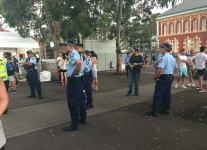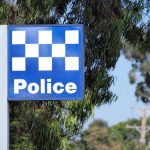NSW Police Are Illegally Strip-Searching Aboriginal Kids

It’s recently come to light that not only is the NSW Police Force doubling down on its use of strip-searches, but officers are also carrying out this invasive practice upon Aboriginal children as young as 11 years old.
Aboriginal Legal Service Western NSW deputy principal solicitor Emily Winborne has outlined she’s aware of cases where First Nations children between 10 and 14 years old have been told to remove their clothes by police. And at times, these searches are being carried out illegally.
Figures obtained by NSW Greens MLC David Shoebridge show that the number of strip-searches that police are carrying out after a positive indication by a drug detection dog has almost doubled.
In 2016, police officers conducted 590 strip-search following a dog indication, while in 2017, the number skyrocketed to 1,124. And over the first five months of this year, officers carried out 735 strip-searches, more than they did during the entire twelve months of 2016.
And what’s more, of all the strip-searches the police carried out last year following a sniffer dog indication, no illicit substances were found 64 percent of the time. This means that 718 citizens were ordered to take their clothes off and squat in front of officers for no real reason.
But, let’s make it clear, this over-reliance on strip-searching isn’t just happening in the context of drug dog searches. And just like other NSW police strategies – such as the Suspect Target Management Program – strip-searches seem to be disproportionately targeting Aboriginal youth.
A bias in the system
Ms Winborne explained that strip-searches, including those conducted upon Indigenous children, occur in a variety of circumstances, some of which involve stopping kids on the street. “One issue of significance is that often an insufficient basis is provided by police as justification for a search.”
“For instance, in a matter involving the suspected theft of a motor vehicle,” the solicitor told Sydney Criminal Lawyers®, “there is no justification for strip-searching a child who cannot possibly have the motor vehicle hidden on their person.”
And this “embarrassing and humiliating” practice, Ms Winborne makes clear, is being perpetrated upon First Nations children against a backdrop of police participation in frontier violence, through to their involvement in the removal of children historically, as well as presently.
“Highly intrusive policing practices such as strip-searching, applied with disproportionate frequency to Aboriginal children, can be experienced as disempowering and discriminatory,” Ms Winborne continued, adding this “leads to decreased self-regulation and poorer health outcomes”.
Watchdog responds to complaints
The Law Enforcement Conduct Commission (LECC) announced at the end of last month that its conducting an investigation into allegations that some NSW police officers are abusing their strip-searches powers.
The sole police oversight body in NSW explained that a number of specific complaints about the police and anecdotal evidence from a variety of community organisations led to the investigation.
The LECC said it had conducted a number of private hearings at the time and more were expected.
And the statutory body isn’t only concerned with specific incidents, but has an interest in training strategies and relevant policies that might be leading to the proliferation of searches.
(No) directive from above
Responding to Budget Estimates hearing questions in late September, NSW police commissioner Mick Fuller said that no policy changes had led to the sharp increase in strip-searches between 2016 and 2017.
However, despite this claim from the state’s top cop, Mr Shoebridge and the Redfern Legal Centre’s head of police accountability practice Samantha Lee both assert that an official change in practice must have taken place in order to account for the drastic rise in strip-searches.
An invasive technique
The powers that NSW police officers have to stop and search individuals without a warrant are contained in the Law Enforcement (Powers and Responsibilities) Act 2002. Section 31 of the Act stipulates how police must conduct a strip-search.
If an officer “suspects on reasonable grounds” that the “seriousness and urgency of circumstances” make a strip-search necessary, they can then carry one out. And it’s these requirements of necessity and urgency that make the rise in strip-searches quite questionable.
Strip-searches must be carried out in private enclosed areas, such as a tent. Although, incidents where they’ve been conducted on the street in full view of others have been reported. And a strip-search must be conducted by a member of the same sex as the individual being searched.
At no time should body cavities – including the mouth – be searched, and neither should officers touch the individual in anyway. No one should be present that doesn’t need to be at the strip-search, and nor should any item of clothing be unnecessarily removed.
And under no circumstances are strip-searches to be carried out on children under the age of 10. Of course, there are those out in the community who would question why children as young as 10 would be asked to remove their clothes in front of adults.
Under the radar
“In general, police seem to have a poor understanding of the legal powers they have to conduct searches and the legal obligations they must abide by when conducting such searches,” Ms Winborne continued.
The solicitor further stated that despite safeguards being in place – especially when it comes to “vulnerable young persons” – officers don’t always abide by them.
Ms Winborne pointed out that in remote and regional areas with large Aboriginal populations most searches result in nothing being found. In Bourke and Brewarrina, around 90 percent of searches result in no find, while in Moree, the rate of unsuccessful searches is as high as 95 percent.
And according to Ms Winborne, these often illegal strip-searches are continuing to proliferate as the large amount that result in nothing being found don’t come to the “attention of defence lawyers, let alone other authorities such as the LECC”.
“In small communities without the protection of any real anonymity, people sometimes feel that they are at risk of further harassment if they complain about police conduct,” Ms Winborne concluded.







